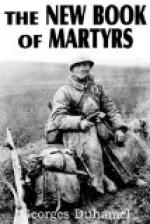It was February 27. Between ten and eleven at night we arrived at a hospital installed in some wooden sheds, and feverishly busy. We were at B——, a miserable village on which next day the Germans launched some thirty monster-shells, yet failed to kill so much as a mouse.
The night was spent on straw, to the stentorian snores of fifty men overcome by fatigue. Then reveille, and again, liquid mud over the ankles. As the main road was forbidden to our ambulances there was an excited discussion as a result of which we separated: the vehicles to go in search of a by-way, and we, the pedestrians, to skirt the roads on which long lines of motor-lorries, coming and going, passed each other in haste like the carriages of an immense train.
We had known since midnight where we were to take up our quarters; the suburb of G——was only an hour’s march further on. In the fields, right and left, were bivouacs of colonial troops with muddy helmets; they had come back from the firing line, and seemed strangely quiet. In front of us lay the town, half hidden, full of crackling sounds and echoes. Beyond, the hills of the Meuse, on which we could distinguish the houses of the villages, and the continuous rain of machine-gun bullets. We skirted a meadow strewn with forsaken furniture, beds, chests, a whole fortune which looked like the litter of a hospital. At last we arrived at the first houses, and we were shown the place where we were expected.
There were two brick buildings of several storeys, connected by a glazed corridor; the rest of the enclosure was occupied by wooden sheds. Behind lay orchards and gardens, the first houses of the suburb. In front, the wall of a park, a meadow, a railway track, and La Route, the wonderful and terrible road that enters the town at this very point.
Groups of lightly wounded men were hobbling towards the hospital; the incessant rush of motors kept up the feverish circulation of a demolished ant-hill.
As we approached the buildings, a doctor came out to meet us.
“Come, come. There’s work enough for a month.”
It was true. The effluvium and the moans of several hundreds of wounded men greeted us. Ambulance No——, which we had come to relieve, had been hard at it since the night before, without having made much visible progress. Doctors and orderlies, their faces haggard from a night of frantic toil, came and went, choosing among the heaps of wounded, and tended two while twenty more poured in.
While waiting for our material, we went over the buildings. But a few days before, contagious diseases had been treated here. A hasty disinfection had left the wards reeking with formaline which rasped the throat without disguising the sickly stench of the crowded sufferers. They were huddled round the stoves in the rooms, lying upon the beds of the dormitories, or crouching on the flags of the passages.
In each ward of the lower storey there were thirty or forty men of every branch of the service, moaning and going out from time to time to crawl to the latrines, or, mug in hand, to fetch something to drink.




